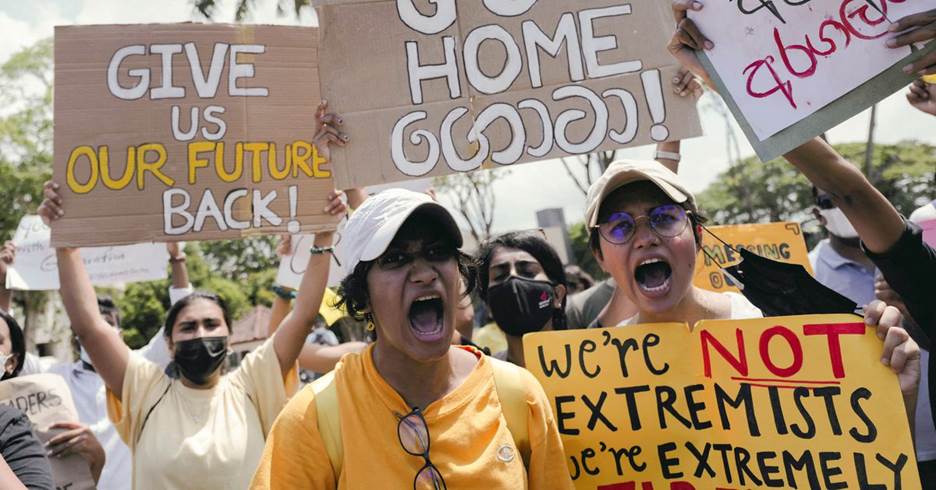
In Washington, Ambassador Samarasinghe has struck the right chord: “Sri Lanka and the United States adhere to common values and principles – representative democracy, human security, human dignity, and the rule of law…” - Photo Reuters
Sri Lanka at 75
By C. Naseer Ahmad
Washington, DC

The recent ransacking of a military commander’s official residence by angry protestors in Lahore, Pakistan, is reminding the world of the violent and chaotic scenes in Sri Lanka almost a year ago, in July 2022, to be precise. Until the recent violence in Pakistan, the popular upheaval had receded from the memory of the world.
In 2022, according to the World Bank, Sri Lanka’s economy contracted by 7.8%. “While all key sectors contracted, manufacturing and construction sectors suffered the most amid shortages of inputs and supply chain disruptions. High frequency indicators, such as purchasing managers’ indices, indicate continued stress in the first quarter of 2023. After peaking at an unprecedented 69.8 percent in September, headline inflation closed at 57.2 percent,” the World Bank report said. With such dire circumstances, rampant unemployment, hopelessness, and popular resentment were bound to explode, and they did so manifestly.
After the downfall of the Rajapaksa regime in Sri Lanka, President Ranil Wickremsinghe has sought to stabilize the country politically as well as economically. Gone are the days when unhappy citizens could band together and despoil an official residence, though daunting challenges remain.
Among the challenges were “Years of fiscal indiscipline, driven primarily by low revenue collections, led to high fiscal deficits and large gross financing needs. Combined with these pre-existing fiscal imbalances, tax cuts in 2019 contributed to a rapid build-up of debt to unsustainable levels. Sri Lanka lost access to international financial markets in 2020 after credit rating downgrades,” notes the World Bank report.
Recognizing the strategic errors of the past, President Wickremsinghe’s government has assiduously sought to reassure international institutions and foreign investors. There is no silver bullet for the complex problems, for which there is no overnight solution and which he inherited from his predecessors. One concrete step towards climbing out of the deep hole that Sri Lanka fell into under the pile of debt was the agreement with the International Monetary Fund (IMF) on March 20, 2023, for a $2.9 billion four-year extended fund facility. It will give the country some breathing room and a chance to get the government’s fiscal house in order.
There is an anticipation that this agreement will help stop the brain drain Sri Lanka has experienced. “We hope that, with the proper macroeconomic policies, many who left the country will see again the potential of Sri Lanka and hopefully decide to come back to the country to help its growth potential,” said Sarwat Jahan, IMF’s Resident Representative in Sri Lanka.
Within the country, Sri Lanka was torn apart by communal tensions and a bloody civil war followed by gross mismanagement by the Rajapaksa clan. Externally, Sri Lanka was looking suspect especially due to the deal – to last 50 years - to hand over Colombo Port to China Merchants Port Holding Company with an 85% stake in warehouse facility.
In an effort to ward off suspicions and improve relations with the United States, President Wickremsinghe made an astute decision to appoint Ambassador Mahinda Samarasinghe as the country’s Ambassador in Washington. Ambassador Samarasinghe is a diplomat, politician and administrator having considerable expertise in international relations, regional and national governance and the promotion and protection of human rights. He has more than 40 years of public service which includes serving as a diplomat, popular representative, member of legislative bodies, holder of provincial and national executive ministerial positions and an international representative of the Sri Lankan State. He led numerous national delegations to the UN Human Rights Council and has also served as the Chair of the Inter-Parliamentary Union’s Committee on the Human Rights of Parliamentarians (Geneva, Switzerland).
In Washington, Ambassador Samarasinghe has struck the right chord. “Sri Lanka and the United States adhere to common values and principles – representative democracy, human security, human dignity, and the rule of law. This forms the basis for 75 years of cooperation, friendship, and open dialogue. Sri Lanka looks forward to building on this close relationship as it looks forward to the centenary of its independence and of its bilateral relations with the United States, in 2048,” he said in a recent speech. “Sri Lanka’s path to recovery will take time, will involve hardship and resolve. Some tough economic reform measures are being taken, as we speak, and will be endured,” he continued.
Recognition of a problem is often considered as the first step towards solving it. From the recent steps taken, Sri Lanka appears to be on the right course and can hope to see light at the end of the long dark tunnel.
Sri Lanka is not the only country in the neighborhood to experience civil strife and economic instability. Pakistan, Myanmar, and Nepal not to mention Afghanistan are not doing too well either. But if Sri Lanka is to get back on a path towards progress, steadfastness and resolute steps will be necessary. Otherwise, the country can easily fall back into the situation Sri Lanka is trying to come out of.

